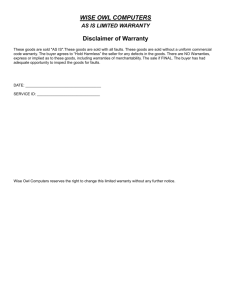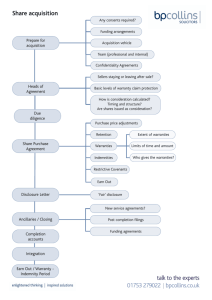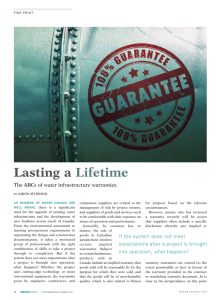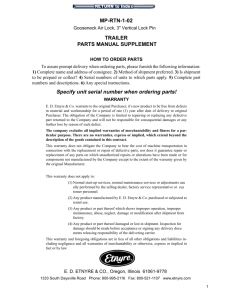23: Sales and Lease Warranties
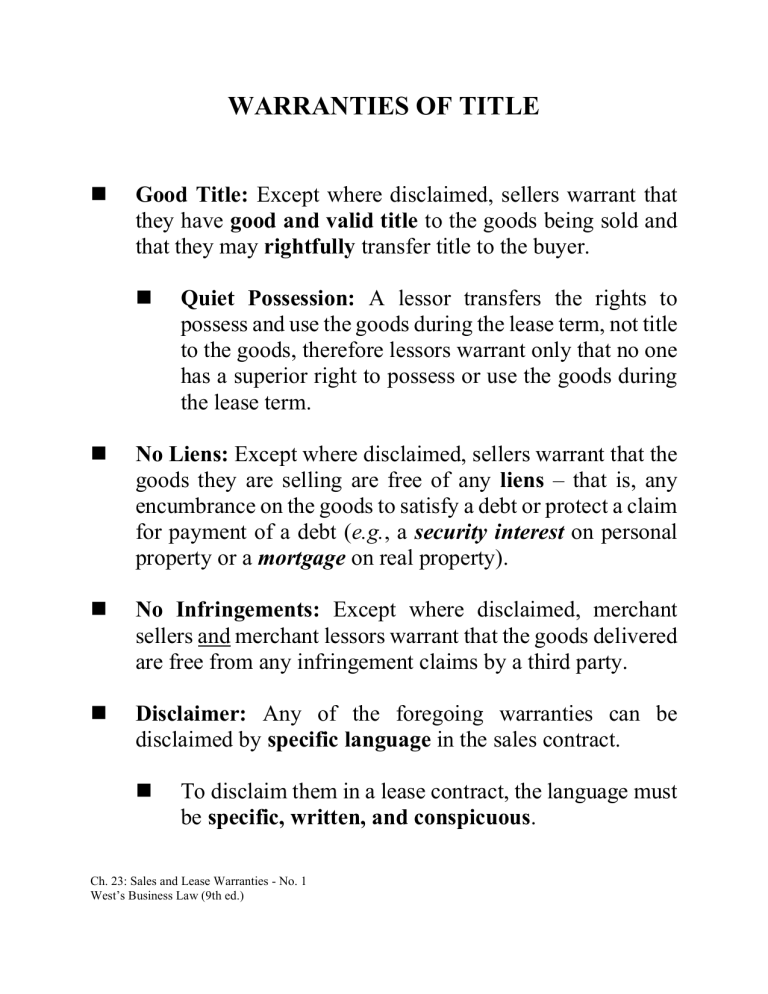
WARRANTIES OF TITLE
Good Title: Except where disclaimed, sellers warrant that they have good and valid title to the goods being sold and that they may rightfully transfer title to the buyer.
Quiet Possession: A lessor transfers the rights to possess and use the goods during the lease term, not title to the goods, therefore lessors warrant only that no one has a superior right to possess or use the goods during the lease term.
No Liens: Except where disclaimed, sellers warrant that the goods they are selling are free of any liens – that is, any encumbrance on the goods to satisfy a debt or protect a claim for payment of a debt ( e.g.
, a security interest on personal property or a mortgage on real property).
No Infringements: Except where disclaimed, merchant sellers and merchant lessors warrant that the goods delivered are free from any infringement claims by a third party.
Disclaimer: Any of the foregoing warranties can be disclaimed by specific language in the sales contract.
To disclaim them in a lease contract, the language must be specific, written, and conspicuous .
Ch. 23: Sales and Lease Warranties - No. 1
West’s Business Law (9th ed.)
EXPRESS WARRANTIES
Express Warranty:
A seller’s or lessor’s oral or written promise, ancillary to an underlying sales or lease agreement, as to the quality, description, or performance of the goods being sold or leased.
Under the UCC, express warranties arise when a seller indicates to the buyer that the goods
(1) conform to any affirmation or promise of fact made by the seller to the buyer about the goods,
(2) conform to any factual description of the goods made, e.g.
, on a label, packaging, or in a brochure, or
(3) conform to any sample or model of the goods shown to the buyer prior to purchase.
The affirmation, promise, description, sample, or model must:
become part of the basis of the bargain between the seller and the buyer; and
constitute more than a mere statement of opinion .
Ch. 23: Sales and Lease Warranties - No. 2
West’s Business Law (9th ed.)
IMPLIED WARRANTIES
Implied Warranty: A warranty imposed by implication or inference from the nature of the transaction or the relative bargaining positions or circumstances of the parties.
Merchantability: A warranty, arising in every sale or lease of goods made by a merchant , that the goods being sold are, inter alia :
(1) reasonably fit for the general purpose for which they are being sold,
(2) properly packaged and labeled , and
(3) of proper quality .
Fitness for a Particular Purpose: A warranty that the goods being sold are fit for the particular purpose for which the buyer wishes to use the goods , which is imposed on any seller who knows that the buyer is relying on the seller’s skill and judgment
to select suitable goods.
The parties’ prior course of dealing or custom and usage in a particular industry or locale may also give rise to an implied warranty.
Ch. 23: Sales and Lease Warranties - No. 3
West’s Business Law (9th ed.)
MULTIPLE WARRANTIES
If two or more warranties are made in a particular transaction, they are generally cumulative , not exclusive . However, if the terms of the warranties are inconsistent with one another, then
an express warranty displaces an inconsistent implied warranty , but not an implied warranty of fitness for a particular purpose;
a sample takes precedence over an inconsistent general description ; and
technical specifications displace an inconsistent sample or general description .
Ch. 23: Sales and Lease Warranties - No. 4
West’s Business Law (9th ed.)
WARRANTIES AND THIRD PARTIES
Vertical Privity: The ability of a buyer to sue a seller other
than its immediate seller for breach of warranty ( e.g.
, suing
John Deere, not (just) Home Depot).
Horizontal Privity: The ability of someone, other than the buyer, who uses or is affected by a product to sue the seller for breach of warranty ( e.g.
, Sue buys lawnmower from
Home Depot, then sells or gives it to Chris, lawnmower fails/injures Chris, Chris sues Home Depot).
Alternative A (majority rule) : Family members or household guests of the buyer may sue for personal injuries caused by a breach of warranty.
Alternative B
: “[A]ny natural person who may reasonably be expected to use, consume, or be affected by the goods” may sue for personal injuries caused by a breach of warranty.
Alternative C
: “[A]ny natural person who may reasonably be expected to use, consume, or be affected by the goods” may sue for personal injuries,
property damage, or economic loss caused by a breach of warranty.
Ch. 23: Sales and Lease Warranties - No. 5
West’s Business Law (9th ed.)
WARRANTY DISCLAIMERS
Express Warranty: Any oral or written express warranty may be disclaimed by a
(1) clear and conspicuous written disclaimer,
(2) which is called to the buyer’s attention
,
(3) at the time the contract is formed .
Implied Warranty of Fitness: To disclaim an implied warranty of fitness for a particular purpose, the disclaimer must be (1) written and (2) conspicuous .
Implied Warranty of Merchantability: The disclaimer does not have to be written; however, (1) it must specifically use the term
“merchantability,”
and, (2) if it is written, it must be conspicuous .
Waiver by Inspection or Failure to Inspect: If the buyer actually examines the goods as fully as desired before entering into the sales or lease contract, or if the buyer refuses to examine the goods at the seller’s request, there is no implied warranty with respect to defects that a reasonable examination did reveal or would reveal.
Ch. 23: Sales and Lease Warranties - No. 6
West’s Business Law (9th ed.)
LIMITATIONS ON REMEDIES
Statute of Limitations: An action for breach of contract under the UCC must be commenced within four years after the cause of action accrues.
A cause of action for breach of warranty under the UCC accrues when the seller or lessor tenders delivery – even if the aggrieved party is unaware that her cause of action has accrued .
Non-UCC limitations and accrual rules apply to claims brought under other legal theories, even when the claims relate to the sale of goods.
Ch. 23: Sales and Lease Warranties - No. 7
West’s Business Law (9th ed.)
MAGNUSON-MOSS WARRANTIES
The Magnuson-Moss Warranty Act (MMWA) modifies
UCC warranty rules with respect to consumer transactions.
It does not require any seller to give a warranty for goods sold to a consumer; however, if the seller chooses to give an express warranty, and if the value of the goods sold is more than $10 the warranty must be labeled as “full” or “limited.”
Full warranties (1) require free repair or replacement of any defective part; and, (2) if the product cannot be repaired within a reasonable time , the consumer must have the choice of either a refund or replacement .
However, the warrantor need not perform warranty services if the product was damaged or unreasonably used by the consumer.
A full warranty generally has no time limit .
A limited warranty is any warranty that does not meet all of the requisites for a full warranty. If an express warranty is a limited warranty, that fact must be conspicuously designated .
The MMWA does not give rise to any implied warranties .
Ch. 23: Sales and Lease Warranties - No. 8
West’s Business Law (9th ed.)
CISG WARRANTIES
The CISG, while not using the same terminology as Article 2, recognizes express and implied warranties, as well as the seller’s right to disclaim or limit those warranties.
Express Warranties: Seller must deliver goods that (1) are of the quantity, quality, and description required by the contract, and (2) possess the qualities of goods which the seller has held out to the buyer as a sample or model.
Implied Warranty of Merchantability: Seller must deliver goods that (1) are fit for the purposes for which goods of the same description would ordinarily be used, and (2) are adequately contained or packaged.
Implied Warranty of Fitness: Seller must deliver goods that are fit for any particular purpose expressly or impliedly made known to the seller, unless the circumstances show that the buyer did not rely on the seller’s skill and judgment in selecting the goods.
Warranty Limits: The CISG (1) recognizes the parties’ ability to “agree otherwise,” suggesting that all implied warranties are subject to limitation or exclusion, and
(2) relieves a seller from liability for a nonconformity that the buyer knew about or could not have been unaware of at the time the contract was formed.
Ch. 23: Sales and Lease Warranties - No. 9
West’s Business Law (9th ed.)
